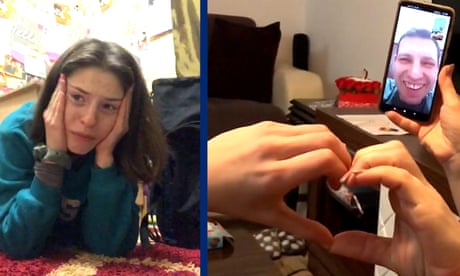- by foxnews
- 04 Apr 2025
‘Like a horror movie’: 19-year-old shares Ukraine escape on TikTok
‘Like a horror movie’: 19-year-old shares Ukraine escape on TikTok
- by theguardian
- 12 Mar 2022
- in news

As Diana Totok and her sister reached through the wire fence separating Romania from Ukraine to grasp her father's hand, it occurred to her that she might never see him again.
Ukraine's new wartime laws barred their father, a pastor, from fleeing the country with them. Nevertheless, he promised his teenage daughters and wife, Svetlana, that they would meet again soon.
Two weeks earlier the 19-year-old's biggest worry had been making a good impression at her new internship. Now she had just a few seconds to say goodbye to her father, her country, and any semblance of the life she assumed she would have.
The only way Totok could think to get through the moment was to film it. Not only did she want to bear witness to what was happening in Ukraine, but, since the start of the bombing days earlier, she had found it easier to process the horror she was seeing through a camera lens.
The video of the goodbye has been viewed more than 20m times. It shows her father leaning his face against the fence and kissing his daughters' foreheads through a gap in the wire.
The video cuts there. Totok saved the final goodbyes for the family alone.
She and her sister, 17-year-old Darina, got on a train with their mother, travelling into the depths of Romania, praying that their father would live to see them again.
Totok was at a sleepover at a friend's house the night the Russian invasion began.
"We woke up because her mum called us and she's like: 'Girls, the war has started, they're bombing everywhere.'"
When Totok learned that the military airbase in her city of Mykolaiv, near the Crimean border in the south, had been bombed, she knew she needed to get back to her family. "I was leaving my friend's house and her last words to me were like, 'Bye, don't die!' You know, it was kind of funny, but it's not."
That night, all four Totoks crammed into the same bed trying to sleep, listening to planes overhead. "It was scary, we had all our clothes on, ready to go to the basement," she says.
It occurred to Totok then that what was happening to her deserved to be documented, so she pulled out her phone and started recording for the first time.
Totok is one of dozens of young people, mostly women, who have been sharing their daily lives in Ukraine on TikTok.
The comments on Totok's TikToks reflect this intimate connection, telling her that they are praying for her family and father, and saying again and again how horrific the situation is.
Unlike platforms such as Twitter or Instagram, which primarily show users content that people they already follow have liked or shared, TikTok is much less reliant on social networks. Its algorithm sends videos to people's home screens, known as the "for you page", based on their interests, pushing out high-performing content far and wide.
"It's absolutely going to change the way we think about conflict," Morrison says. "War has traditionally been written as the history of great men making military decisions."
On the second day of the war, Totok's parents decided they needed to get their girls across the border.
This was another moment Totok filmed: throwing clothes in a bag, pausing in fear every time a plane flew overhead. As the realisation sank in for her that she was leaving her pets and home of 16 years behind, she began to cry. But rather than hiding it, she left the camera running.
Morrison says there is "a power" in the victims of war making the world "bear witness to what they are going through".
Another TikToker, 20-year-old Valeria Shashenok, lives in the heavily bombed northern city of Chernihiv, and has been using dark humour and memes to show the devastation.
She has taken viewers on an MTV Cribs-style tour of her bomb shelter, danced to the sounds of air raid sirens and gesticulated wildly in front of destroyed blocks of flats.
Morrison says comedy has always been a staple for those on the frontline of tragedy, and, although it may be surprising to some, this melds perfectly with the internet culture of younger generations.
"Turning things that are out of your control into things that are funny is exactly what social media is built on. It's what youth expression is built on," she says.
All the while, the family try to keep in touch with their father. "We're trying to call him at least like once every six or so hours, just so we know that he's still alive, you know?" she says.
Totok recorded one of these video calls. In it, the family crowds around a phone, her father's smile filling up most of the frame as the girls make heart shapes with their hands.
"Filming it kind of helps for a moment," Totok says.
- by foxnews
- descember 09, 2016
'I traveled for an entire year for free - and saved $15K'
Hailey Learmonth explored Australia without paying rent, thanks to pet sitting. She saved $15,000, lived on farms, and embraced remote work to travel on a budget.
read more


